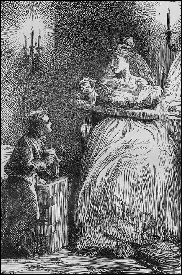Rantipole
When in Great Expectations Charles Dickens has Pip’s ill-tempered older sister refer to him as “young Rantipole”, his readers would have known it was not a compliment. It actually refer to somebody who is wild, disorderly, rakish, ill-behaved or reckless. At the end of the nineteenth century, Dr E Cobham Brewer, the first editor of the Dictionary of Phrase and Fable, remarked that “The late Emperor Napoleon III was called Rantipole, for his escapades at Strasbourg and Boulogne. In 1852 I myself saw a man commanded by the police to leave Paris within twenty-four hours for calling his dog Rantipole.”

Pip and Mrs Havisham, from the
1862 edition of Great Expectations
Unlike Dr Brewer, we do not believe that the word derives from the Dutch randten, to be in a state of idiocy or insanity, though it is accepted that the second half is poll, meaning the head. It is now thought the first part is from rant (or possibly the English dialect ranty, “riotous” or “wildly excited”) and that the whole is a fanciful creation by some unknown person around 1700.
It was equally well known in North America (Noah Webster had the noun and verb in his dictionary of 1806) and it appears in several works by Washington Irving, including The Legend of Sleepy Hollow: “This rantipole hero had for some time singled out the blooming Katrina for the object of his uncouth gallantries, and though his amorous toyings were something like the gentle caresses and endearments of a bear, yet it was whispered that she did not altogether discourage his hopes.”
Captain Francis Grose noted in his Dictionary of the Vulgar Tongue (1811) that to ride rantipole was the same as riding St George. This turns out to be a reference to sex with the woman on top, which Grose notes was "said to be the way to get a bishop".
